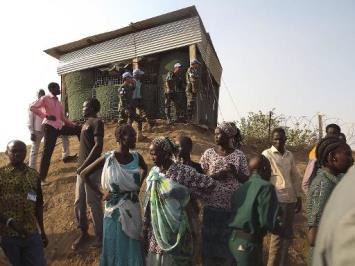62,000 displaced by South Sudan violence: OCHA
December 22, 2013 (JUBA) – The UN Office for the Coordination of Humanitarian Affairs (OCHA) says it has received reports that up to 62,000 people have been displaced by the violence in South Sudan, including some 42,000 currently seeking refuge at UN bases, adding that it expects that number to climb amid the worsening security situation in the country.

It is estimated that at least 20,000 people are sheltering at the two main UN Mission in South Sudan (UNMISS) bases in Juba, while at least 15,000 have sought refuge with UNMISS in Bor, 5,000 in Bentiu and 2,000 in Pibor.
There have also been cases of unaccompanied children, either separated from their families or orphaned, seeking shelter at UNMISS sites.
Five of South Sudan’s 10 states have been affected by armed violence, with looting of humanitarian compounds reported in Jonglei and Unity states, OCHA said.
More than 500 people are estimated to have been killed since violence erupted in Juba on Sunday after clashes between rival factions of the presidential guard.
The violence is the is the worst ever conflict in the country’s post-secession era and has raised fears of a full-scale civil war as fighting increasingly takes on a tribal dimension.
The violence has spread to Jonglei, with continued fighting in Bor, Gumuruk, and Likuangole. Two Indian peacekeepers were killed and one wounded after the UNMISS base in Akobo was attacked by armed youth. The mission estimates that at least 11 civilians who had been sheltering at the base were also killed in the attack.
The security situation has also deteriorated in Unity state, with armed violence reported in Bentiu and Pariang, while there have also been reports of fighting in parts of Central Equatoria.
Providing protection for the huge number of civilians affected by the ongoing conflict remains an increasing concern given ongoing insecurity in the country, OCHA said, describing humanitarian conditions for people sheltering inside UN bases as “challenging”.
The security situation has also severely limited humanitarian operations throughout the country, OCHA said.
The UN has evacuated all non-essential staff based in Juba and humanitarian agencies still operating in the country are confined to UN bases, meaning aid workers have no access to civilians who may be displaced or otherwise affected outside.
“Protection of civilians is a major concern in all areas affected by the fighting. Reports of people being targeted based on ethnicity in different parts of the country are particularly troubling. Furthermore issues of lack of command and control of various armed groups are a serious concern”, OCHA said in its report.
“Due to the challenging conditions in the sites with displaced people, compounded by the tense security situation, protection concerns are also likely to increase in these locations”, the report adds.
Availability of food in the two sites in Juba remains limited, with many of the people displaced concerned about leaving the base even during daytime to collect or buy food, for security reasons. Food needs are also high among civilians in the UN base in Bor.
As a coping mechanism many people were rationing food or skipping meals altogether, OCHA found.
“If protracted, the inadequate food consumption, coupled with the reported high incidence of disease and poor water, sanitation and hygiene conditions pose a
risk for the nutritional status of the displaced, especially pregnant and lactating women and children”, OCHA said.
According to OCHA, clinics at both UN bases in Juba have been providing emergency healthcare for serious cases, including to women giving birth on the base, but are working at full capacity and are not able to treat adult patients who do not have life-threatening conditions.
The agency said there was a need to provide site planning support to improve overall living conditions in UNMISS bases, where malaria and diarrhoea remain a major threat.
Aid agencies are providing emergency healthcare and water and sanitation assistance to displaced people, and are due to begin distributions of shelter supplies, household items and basic food assistance on Sunday. Registration of displaced people is also scheduled to begin the same day.
(ST)
